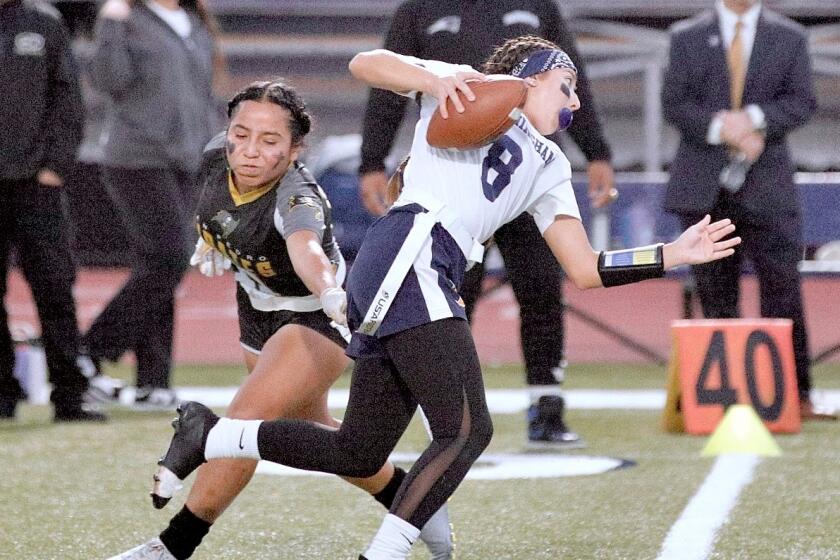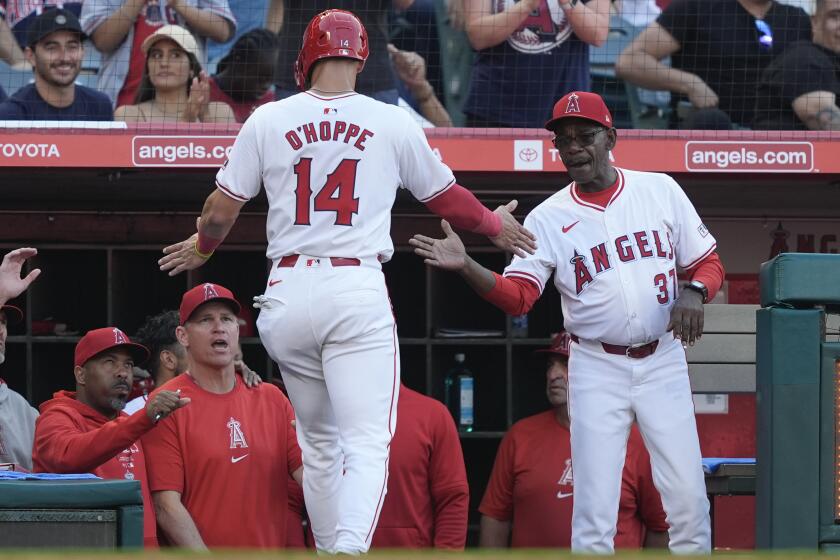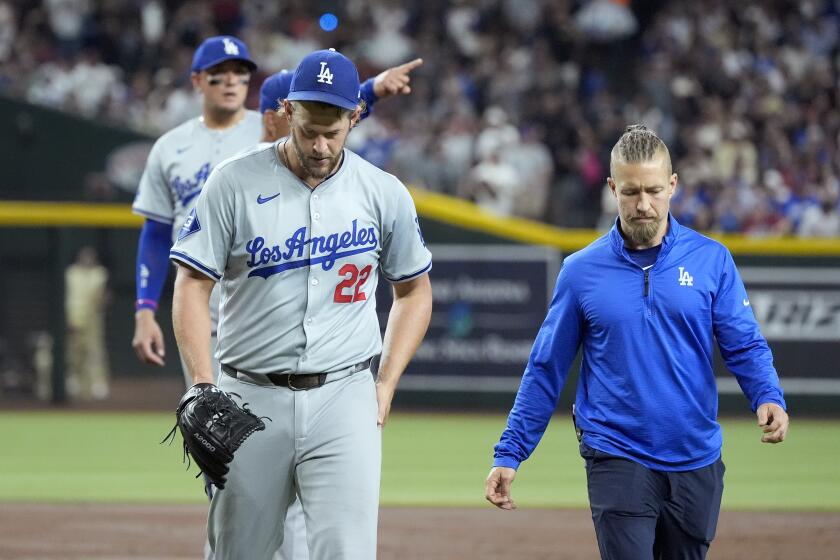WCC Coaches Appreciate, Envy Gonzaga
Instead of fretting about how Gonzaga has run roughshod over the West Coast Conference in recent seasons, rival basketball coaches say they admire the Bulldogs for raising the standard of excellence and bringing national attention to the WCC.
“Their success has been healthy for our league,” Coach Steve Aggers of Loyola Marymount said, adding that the WCC’s Ratings Percentage Index has risen. “Our visibility nationwide because of television has risen. And that helps all of us.
“It’s like when the water in the harbor goes up, all the boats rise.”
Never mind that comparing Gonzaga with the other WCC teams is like comparing a racing yacht with a fleet of dinghies.
The fourth-ranked Bulldogs (25-2) are having another dominant season heading into the WCC men’s tournament, which starts today at the Leavey Center.
Gonzaga won the WCC regular-season title with a 14-0 record, becoming the first team to accomplish that feat since Doug Christie-led Pepperdine went unbeaten in the 1991-92 season. And the Bulldogs are assured of a WCC-record sixth consecutive appearance in the NCAA tournament, win or lose this weekend.
In five seasons under Coach Mark Few, Gonzaga is 63-7 (.900) in WCC games. While extending their winning streak to 18 games this season, the Bulldogs beat conference opponents by an average of 19 points en route to winning the title by five games. They have won four consecutive WCC titles and six of the last seven.
Parity, this is not. But Gonzaga’s runaway success isn’t causing any hue and cry among opposing coaches.
“I think it’s great,” Pepperdine Coach Paul Westphal said. “Any time somebody from your particular conference excels, that reflects well on the rest of the conference.
“It creates more motivation for everybody,” he said, adding that he believes the other WCC teams will “take steps to compete with them, and possibly even pass them.”
That won’t be easy. Although Gonzaga loses several key players to graduation, including guard Blake Stepp, the two-time WCC player of the year, and all-conference forward Cory Violette, the Bulldogs have restocked their roster thanks to consistently strong recruiting classes.
“I think their second five would have a good chance of winning our conference,” San Diego Coach Brad Holland said. “They’re that deep.”
The WCC all-freshman team included two Gonzaga forwards, 6-foot-9 Adam Morrison and 6-8 Sean Mallon, and next season the Bulldogs will add 6-10 Josh Heytvelt, a sought-after high school player whose list of suitors included North Carolina, Kansas, Arizona and UCLA.
Morrison, Mallon and Heytvelt are from the Spokane, Wash., area, where Gonzaga is located.
“They own the Pacific Northwest,” Aggers said of the Bulldogs. “You’re not going to go up against them in a recruiting battle and win right now.”
Recruiting against Gonzaga has made Aggers’ rebuilding job at Loyola Marymount that much tougher, he said. But the Bulldogs’ high national profile has opened doors.
“Now when we go out and talk to recruits and tell them we play in the West Coast Conference, they say, ‘Oh, yeah, that’s the league Gonzaga’s in,’ ” Aggers said.
“When you have a team in your league that’s in the top five in the country, that’s going to help all of us attract better talent.”
Which is what they need to do, he said, “so we can compete with [Gonzaga].”
Westphal said Gonzaga “has as good or a better chance” of recruiting top players in the Pacific Northwest than any of the four Pacific 10 Conference schools in that region: Washington, Washington State, Oregon and Oregon State.
“They’ve had some good timing,” Westphal said. “A lot of those Northwest Pac-10 schools have been down.”
He said Gonzaga had been able to point to itself as the elite program in the Northwest for a couple of years.
“If you give San Diego or LMU or Pepperdine the same players USC and UCLA gets year after year, pretty soon you’d see a little bit more prominence on the court too,” he said.
So how did Spokane become the West Coast’s cradle of basketball? Gonzaga, which joined the WCC in 1979, didn’t win a conference title until 1994 and didn’t make its first appearance in the NCAA tournament until 1995.
Aggers gives much of the credit to Dan Fitzgerald, who coached Gonzaga for 15 seasons, from 1978 to ’81 and 1985 to ’97. Fitzgerald helped build the school’s loyal fan base, developed summer youth camps and fostered relationships with high school coaches in Seattle and Portland.
Those lessons were passed to Bulldog assistants Dan Monson and Few when they followed Fitzgerald as head coaches.
“Having their staff together consistently for 10 or 11 years is one of the factors of why they’ve been good,” Aggers said. “They’ve had the same coaches for a long time.”
Gonzaga also has benefited from such intangible qualities as team chemistry. Asked this week to explain the Bulldogs’ sustained excellence, Stepp replied, “It all starts with recruiting. The coaches recruit the right type of guys. Not necessarily the best players, but players who are going to fit into the program.
“When you have guys who like each other and play with each other and watch out for each other, it’s hard not to be successful.”
Every coach in the WCC would like to tap into that formula, though most agree it’s easier said than done.
“We’re all competitors,” Aggers said, “but we’re also very envious.”
More to Read
Go beyond the scoreboard
Get the latest on L.A.'s teams in the daily Sports Report newsletter.
You may occasionally receive promotional content from the Los Angeles Times.










